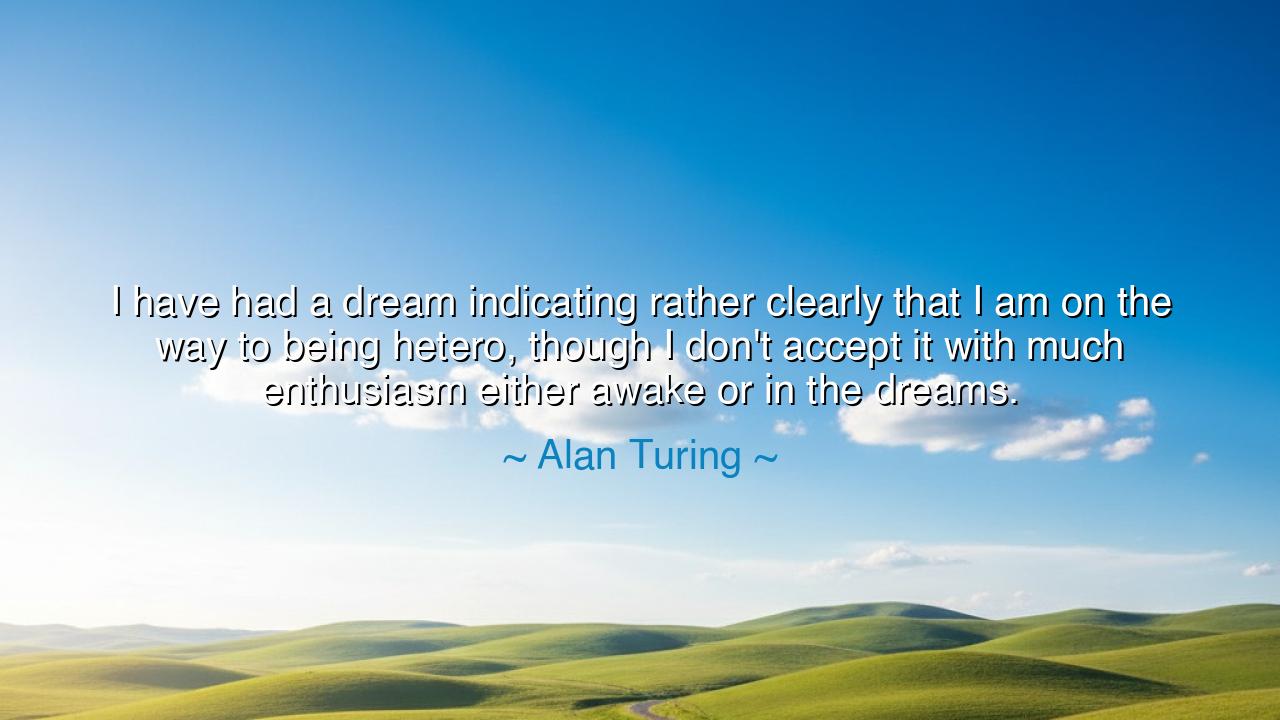
I have had a dream indicating rather clearly that I am on the way
I have had a dream indicating rather clearly that I am on the way to being hetero, though I don't accept it with much enthusiasm either awake or in the dreams.






“I have had a dream indicating rather clearly that I am on the way to being hetero, though I don't accept it with much enthusiasm either awake or in the dreams.” Thus spoke Alan Turing, the brilliant mathematician, the codebreaker of war, and the quiet martyr of a world not yet ready to understand him. In these few words, fragile yet profound, he revealed the aching conflict of a mind divided — not between genius and folly, but between the self that is true and the self that society demands. His words are not merely the musings of a dream; they are the whisper of a soul yearning to reconcile identity with expectation, love with law, truth with fear.
Turing’s dream was not about becoming heterosexual, as some might take it, but about the struggle between authenticity and conformity. In his time, to be different — especially in love — was to walk in shadow. He lived in an age when the heart’s natural language was forbidden, when affection between men was branded as a crime, and the pursuit of truth within oneself was punished as rebellion. His “dream” may well have been the mind’s desperate attempt to negotiate peace with a hostile world, to find survival in a place where being oneself invited ruin. Yet even in that dream, he confessed, he felt no joy — no “enthusiasm” — for the transformation, for he knew it was not his own truth.
In this confession lies an ancient human battle: the tension between inner truth and outer pressure. From the time of the philosophers, the sages have warned that to betray oneself is the gravest form of death. Socrates drank the poison rather than deny his convictions. Likewise, Turing, though punished and humiliated, refused to live falsely. His dream, therefore, is the dream of every person who has ever felt the weight of the world’s expectations upon the soul — the dream of being accepted, the dream of belonging, and yet, the deeper dream of remaining authentic, even when authenticity costs everything.
Consider, then, the tragic fate of Turing himself. Having saved nations through his intellect — breaking the Enigma code and hastening the end of World War II — he was later condemned not for treason, but for love. Convicted for his sexuality, he was forced to undergo chemical castration, a cruel attempt to “correct” what was never wrong. His body was altered, his spirit wounded, yet his mind — his luminous, defiant mind — remained free. In his quiet resistance, even in despair, he taught humanity a lesson greater than any algorithm: that truth of the heart cannot be rewritten by decree, and that no punishment can erase what is natural and real within the human spirit.
His dream, then, stands as a mirror to all who struggle between what they are and what the world insists they must be. It is a reminder that even the most brilliant minds can be burdened by loneliness, and that genius does not protect the heart from pain. Yet from that pain rises understanding. Through his suffering, Turing revealed that moral and emotional intelligence — the courage to know and love oneself — is as vital as mathematical logic or scientific discovery. His dream was not prophecy; it was confession, and in that confession lies his immortality.
The lesson is clear: do not trade your truth for approval. The world will always have its rules, its judgments, its narrow definitions of what is acceptable. But greatness — true greatness — is born from the courage to live as you are, not as others wish you to be. If your heart speaks in a language the world does not understand, do not silence it; refine it, protect it, and let it be your compass. To hide from oneself is to live half a life; to stand in truth, even trembling, is to live fully.
Let those who hear these words remember Turing not only as the father of the modern computer, but as a symbol of integrity, of the eternal struggle for freedom — both intellectual and emotional. His dream teaches us that the quest for truth begins not in equations or inventions, but in the acceptance of one’s own soul.
So, when you find yourself at the crossroads of expectation and truth, remember the quiet wisdom in Turing’s reluctant dream. Seek not to be what others will praise, but what your heart will recognize. For to know oneself, and to honor that knowledge, is the highest form of intelligence — and the deepest act of courage.






AAdministratorAdministrator
Welcome, honored guests. Please leave a comment, we will respond soon